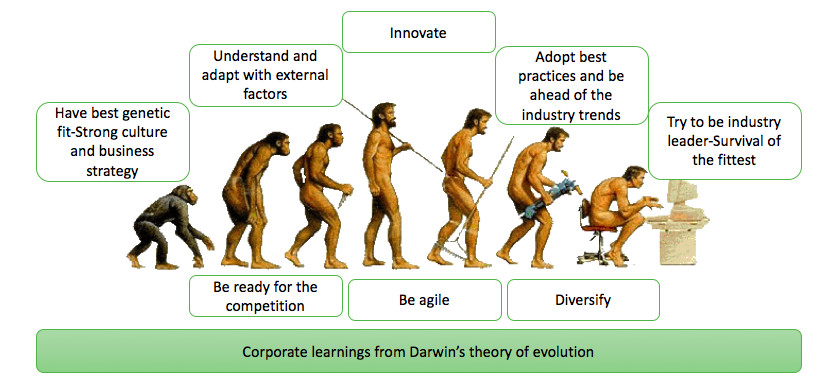
What corporates should learn from Darwin's Theory of Evolution
Charles Darwin is one of the greatest scientists of the history, explained the 'theory of evolution by natural selection'. Recently, I came across this theory, which accidentally gave the view for how this also applies to corporates. It gives excellent learning on how to survive in corporate ecosystems.
Darwin’s Theory says:
"Variation is a feature of natural populations and every population produces more progeny than its environment can manage. The consequences of this overproduction are that those individuals with the best genetic fitness for the environment will produce offspring that can more successfully compete in that environment. Thus, the subsequent generation will have a higher representation of these offspring and the population will have evolved."
In simple words,
- More individuals are produced than can be sustained
- Every individual struggle to survive resulting in tough competition
- Only those survive who have best genetic fit, and can adapt to changes (adaptation)
- Because of the response to adaptation, new species will arise
We can have this analogy for corporates.
Every year, we have more new companies, startups emerging. Each one of them struggles to survive competing with each other. Companies having the strong vision, mission and culture at their central strategy give very tough competition. Companies having long-term vision and mission, understand the competitive landscape, predicts the future and formulate strategy accordingly. Such companies are agile for adapting sudden shocks and changes. Hence proves to survive in long term.
Companies which do not formulate strong vision, strategy and adapt to changes, they wash out from the competition.
For example, when automobiles industry was at pick there were numerous companies, the startup where came up. Actually, more than how much the industry or economy can sustain,
The sustainability issue was not due to oversupply but it was primarily because of core economy was going through the transition, such as physical communication virtual communication (computer, internet then mobile), physical transactions to online and virtual transactions etc. So only the fittest, and who responded to change positively could survive and the new breed of companies in this area has emerged
It happened always and will always happen again and again, hence let's see some of the core lessons for corporates from this theory:
- 'Variation is the feature of population'-Competition will always be there - Be ready
The competition will always rise. New players will always enter into the competition. Be ready for the competition.
2. 'Those individuals with best genetic fitness produce offspring that can more successfully compete': Formulate strong strategy-Vision and Ethical culture
Create strong ethical culture, vision and mission at the centre of the company’s strategy. Adopt best practices. Create strong shock absorbing strategy such as emergency funds, investments in R&D etc. Invest in people. This creates the strong genetic structure of the organization.
3. Survival of the fittest: Adapt to changes, be agile and innovate
Adaptation is the property of living being. Whichever species could not adapt to the emerging changes or shocks are wiped out.
This applies to corporates also. Companies need to invest in for future technologies, R&D. We are in the era of the fourth industrial revolution-Digital revolution. Companies need to update themselves with digital technologies and best industrial practices. They need to keep innovating. If we look at some of such examples who update themselves as per the time and adapted themselves to the dynamic corporate environment, they are still ruling the market. Examples of such organizations can be GE, Ford, GM etc.
We have some examples of the companies who didn’t do it. They were ruling the market once but now struggling to be in the market. For example, Nokia, Kodak could not adapt to changes and didn’t adopt technologies of the feature. They faced tremendous loss.
Also, in present dynamic era, companies need to be agile. They have to adapt to latest technologies and walk with emerging trends.
4. 'Subsequent generation will have a higher representation and the population will have evolved'-Diversify the businesses
Companies having traditional businesses, at least need to modernise their business processes with the best practices or they need to diversify. There are emerging sectors which we call as business sectors for future, such as the Internet of Things (IoT), Virtual Reality (VR), Drones and its application, Blockchain and its applications etc.
Such business is going to rule the future. Hence diversification strategy will help companies to minimize the risk and have first movers advantage into these sectors. It also increases the ability to sustain shocks.
While adapting to the changes not only companies but also the industry management processes moved through gradual changes. We moved from 'Command and control leadership' to 'agile leadership' style. We adopted new methodologies and updated them gradually- Waterfall, lean, Kanban, to Scrum.
And to survive, we need to keep doing this.
This principle gives immense clarity towards corporate strategy. Leaders need to understand this and formulate it accordingly.
Detailed Article- http://agilebeyondboundary.com/what-corporates-should-learn-from-darwins-theory-of-evolution/
Author: Vijay S Magdum, Senior Consultant-Capgemini Financial Services
Reference: https://www.ndsu.edu/pubweb/~mcclean/plsc431/popgen/popgen5.htm accessed on 12th Oct. 2017

--
1mothis website has helped me so much in my studies
psychologist . educator . coach . artist . founder @ flawed-human.com
1yInês Bartilotti